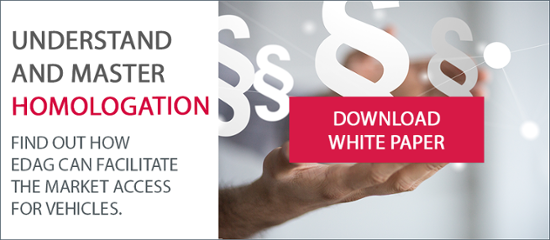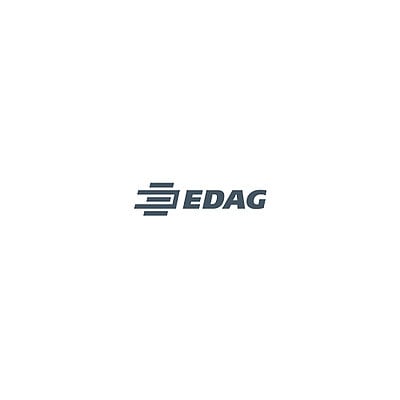How is type approval regulated in the EU? Can approval be transferred to other markets, or what rules apply there? And what are the greatest challenges in the homologation process? A roadmap to navigate the jungle of international laws, regulations and ordinances.
In the EU, homologation - in other words confirmation of the fact that a vehicle complies with all relevant legal regulations - culminates in type approval. Without it, no production vehicle may be put on the market.
There are different regulations regarding completion of this process in the various global markets. In the EU and China, conformity is tested and officially certified by authorized testing and certification bodies. In the USA and Canada, self-certification along with supporting documents is deemed sufficient; only for emissions is certification by the environmental authorities required.
Legal principles
Leaving aside the major markets of North America and China, in a United Nations agreement signed in 1958 (UN1958), more than 60 countries agreed to compliance with and the reciprocal recognition of certain standards for vehicle approval. Although the individual EU member states had already entered into the agreement, practical reasons caused the EU to join as a single entity in 1998. The agreement facilitates both the import/export of complete vehicles that have been given type approval in the EU and the sale of components and separate, ready-to-install technical units requiring approval.
Unfortunately, this agreement only covers a very specific niche extending up to type approval for complete vehicles. This means that the development and certification of vehicles for the European Economic Area (EU with Iceland, Liechtenstein and Norway) is based on a combination of EU and UN regulations. Once vehicle type approval has been obtained from just one motor vehicle authority within the EU, the vehicle can then easily be sold throughout the EEA, i.e. in 30 countries.
Of central relevance here is EU Regulation 2018/858, which regulates the approval and market surveillance of motor vehicles and vehicle trailers, systems, components and separate technical units for the vehicle categories passenger cars, vans, buses, trucks and their trailers.
This simplifies matters for manufacturers of components requiring approval, as these are almost entirely subject to UN regulations. Without any additional measures, the economic area is equivalent to that in the UN1958 Agreement, which currently comprises 68 member states. Accordingly, the choice of motor vehicle authority and testing and certification body is greater. Example: A headlamp is subject to UN Regulation No. 149. Once the appropriate component approval has been obtained, it can be sold in 68 countries with no additional effort.
Development schedules for complete vehicles are closely bound up with the granting of new component approvals wherever the vehicle has features requiring corresponding certification, e.g. the correct installation of light-signaling devices. This must be taken into account, because certification at vehicle level follows on from component level, never the other way round.
There are even some systems that require double certification for the EU market, in accordance with both EU and UN regulations. One example of this is the event data recorder, a kind of black box which became compulsory in new types of passenger cars in July 2022. The deadline for models already on the market and other vehicle categories, for instance heavy trucks, deviates from this (see Homologation Workshop, Module 2). Identifying such different usage data is also a task for homologation.
Legal competencies …
As guides to see you through the jungle of laws and regulations, the homologation team at EDAG Engineering GmbH can provide a valuable service. Using various sources, the experts have constant access to virtually all current vehicle regulations and, with their extensive experience, can also provide assistance with the interpretation of more recent laws and regulations. 
In the development phase, this means that, from the very beginning - namely when the specifications and load cases for a specific project scenario are being derived, EDAG ensures that its development volumes are certifiable or that certification capability is implemented. Likewise, pre-tests, i.e. tests carried out during the ongoing development process, are also part of the service portfolio.
For the subsequent certification/self-certification phase, support is offered with the technical documentation essential for both processes. This includes the creation of the corresponding drawings and technical reports. EDAG offers a comprehensive range of advice on role allocation, timing, initial manufacturer assessment and other necessary steps with testing and certification bodies and authorities.
It should be noted that EDAG's expertise is not confined entirely to the passenger car sector, but extends to almost all vehicle categories, including trucks and delivery vans, buses, trailers, Class L two-, three- and four-wheelers and vehicles for special purposes – from motorhomes and armored vehicles to a van converted to take a wheelchair.
... and expertise in dealings with the authorities and testing and certification bodies
Another highlight is the special authorization EDAG has for street-legal test vehicles. This covers various vehicle categories: passenger cars, vans, buses, trucks and the L category. The field of applications ranges from vehicles modified by EDAG to new models individually manufactured by EDAG, which are then produced in series by the customer. This allows EDAG to put modified vehicles onto the road without having to have them re-evaluated by the TÜV testing association, which saves time and money during the testing process.
Modifications may be made to the engine, engine control and emissions performance, but also to systems such as the brakes and steering. This also includes driver assistance systems up to SAE Level 2. The EDAG Group also offers its services as a partner to suppliers of such assistance systems who wish to have their ready-to-install ADAS calibrated and tested in live situations, without having to book a test site.
Detailed information in the workshop
EDAG provides a wealth of interesting information and details concerning homologation in specially devised customer seminars. The target group consists of developers, project coordinators, project managers, sales, vehicle manufacturers, suppliers and new OEMs. The seminars are structured into three modules:
- Module 1 – Basic homologation seminar: Participants should have an understanding of vehicle certification/self-certification and the roles of those involved, and be able to implement legal compliance in product specifications, quotations, etc.
- Module 2 – EU Safety Regulation GSR 2: Participants learn about the contents of and background to the second generation of the EU Safety Regulation, understand the phased implementation dates of new requirements, and gain greater insight into certain driver assistance systems.
- Module 3 – Driver assistance systems and the automation of driving: Participants have an understanding of the basics of ADAS and ADS, of systematization in accordance with SAE J3016, of the requirements for homologation, and of the differentiation between certification and product liability.
The basic seminar is also available on the carhs knowledge platform for the first time this year, twice in German and twice in English. The first seminar will be held on May 23.
Do you have questions about homologation or are you interested in a customer seminar? Then speak to Christian Radt, Homologation Project Leader at EDAG Engineering GmbH, in the Complete Vehicle Validation department. Or download our white paper "Homologation: Nothing to worry about" here. It provides comprehensive information on the basic homologation framework and highlights challenges and potential stumbling blocks. At the same time, it outlines ways of finding competent support for this process. 





